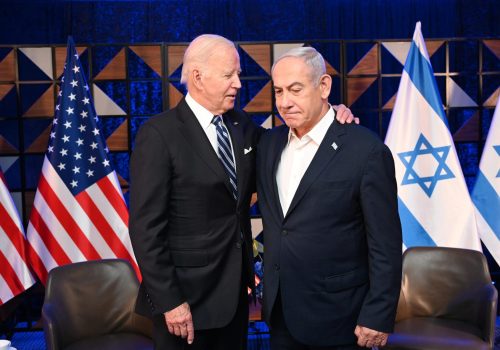The world is on fire. The United States must lead.
The world is on fire. We will react to every provocation, every horrendous act, every barbaric atrocity as civilized people would. But now is the time for the United States, the leader of the free world, to look at the big picture and determine what should be done to protect the security of its people and like-minded allies, beyond simply reacting to events.
Some may ask: What should the United States’ role be in addressing the chaos now evolving on two continents? My answer is that the United States is the only power that can keep the tensions from spreading to Asia and beyond, and unite freedom-loving countries to solve the issues that will deter bigger conflicts.
Today, NATO has thirty-one, soon to be thirty-two, allies that have pledged to each other that war against one is a war against all; that is, the allies will all send troops into harm’s way to protect all of their populations. Importantly, NATO also has approximately forty partners, including those in Asia and the Middle East, that the Alliance coordinates with and includes in its missions for interoperability. NATO’s partners strengthen the security umbrella of the Alliance when they participate in missions, though it is completely voluntary.
The two conflicts in focus currently both affect US security interests, though in different ways.
The Russian invasion of Ukraine, a sovereign democracy in Eastern Europe, is a brutal reminder that Russian President Vladimir Putin never stopped believing his fantasy that he can recreate the Soviet Union. NATO is committed to helping Ukraine because it is clear from Putin’s previous attempts to take over large portions of the country that, if successful in Ukraine, he will continue his quest to other post-Soviet states. If allies do not act together to help Ukraine protect its sovereignty, then it’s realistic to anticipate Putin invading a NATO country on Russia’s border, which will then involve troops and war machines from NATO allies—as our collective commitment is sacred. To those who question why the United States should continue to give weapons to Ukraine, it must be clear that the millions of dollars spent now are to avoid even more costly requirements of blood and treasure if Ukraine fails to win, and we must then defend a NATO country against such an incursion.
The brutal attack on Israel on October 7 also corresponds to a vital interest of the United States. Israel is the only true democracy in the Middle East, where Iran is the dominant adversary that is close to (if not already) perfecting nuclear capability. Iran has been fomenting terrorism throughout the Middle East for years. Containing the proliferation of nuclear warheads that could be obtained and deployed in a wider conflict is a vital security interest of the United States. This is why the United States must aid Israel, which is fighting for its very existence. Despite the attention-grabbing rhetoric of a minority view, I am confident that the overwhelming majority of Congress, both Republicans and Democrats, understand the stakes of these conflicts for US security.
So what should the next steps be?
- To address the international crises, Republicans must unite behind a speaker of the House who is committed to working with Democrats in the House, Republican and Democrat leaders in the Senate, and the administration to show US leadership for our allies and make clear to our adversaries: We will not be divided when action is required. The message from our elected leaders should be unity and strength to our allies, and deterrence against any adversary who might have designs to distract the United States to another front. The United States’ commitment to lead can handle two, three, or more conflicts, if called.
- To assure a longer-term solution to Iran’s menacing, the United States should operate alongside its partners in the Middle East to achieve the agreement that was progressing with Saudi Arabia and Israel to potentially lead to a two-state solution for Palestinians. They deserve a legitimate government entity that creates a homeland for their people. This is the necessary stabilization required to eliminate the festering terrorism perpetrated by the Iranian proxies Hamas and Hezbollah, which continues to erupt because the root issue is never solved.
- Congress should pass a supplemental funding bill that leads with rebuilding US arms reserves, to communicate to the world that we will be ready for any eventuality. The specifics could include an agreement for the needs of Ukraine, Israel, our own US sovereign borders, and a plan to replenish our necessary ships, planes, missiles, tanks, and armaments.
- Considering that we are in wartime, Congress should work with the administration to make a percentage cut (perhaps 5 percent) to every discretionary appropriation bill. This would exclude entitlement programs such as Medicare and Social Security, and much of the defense budget. Obviously, negotiations would be necessary, but Americans would welcome the chance to see that Congress and the administration could work together to address emergency priorities while also acknowledging fiscal responsibility, just as households all over the country are doing. And it would be a powerful signal to our adversaries that we are serious, we are united, and we will sacrifice to be so.
This is a time for the United States to lead. That means looking beyond the present to see what will secure our freedom and values for the long term. We must look up, not down; outward, not inward. Treating the escalating global crises as a war priority is the best deterrence to avoid one.
Kay Bailey Hutchison is a former US ambassador to NATO, a former US senator for Texas, and a member of the Atlantic Council board of directors.
Further reading
Mon, Oct 23, 2023
Live expertise: The latest insight as the Israel-Hamas war intensifies
New Atlanticist By
Atlantic Council experts are analyzing the Israel-Hamas conflict as it enters its third week.
Wed, Oct 18, 2023
The Israel visit was just the start. Here’s what Biden needs to do next.
New Atlanticist By William F. Wechsler
The US and Israel should develop and publicly issue a joint set of common principles that will guide the future of Gaza, once Israel’s full military objectives against Hamas are reached.
Tue, Oct 10, 2023
Ukrainians fear becoming hostage to US political paralysis
UkraineAlert By Peter Dickinson
The unprecedented removal of Kevin McCarthy as House speaker has thrust US politics into uncharted territory while also sparking alarm across the Atlantic as Ukrainians fear for the future of vital American military aid, writes Peter Dickinson.
Image: A general view of the US Capitol Building, in Washington, DC, on Monday, October 23, 2023. (Graeme Sloan/Sipa USA)


